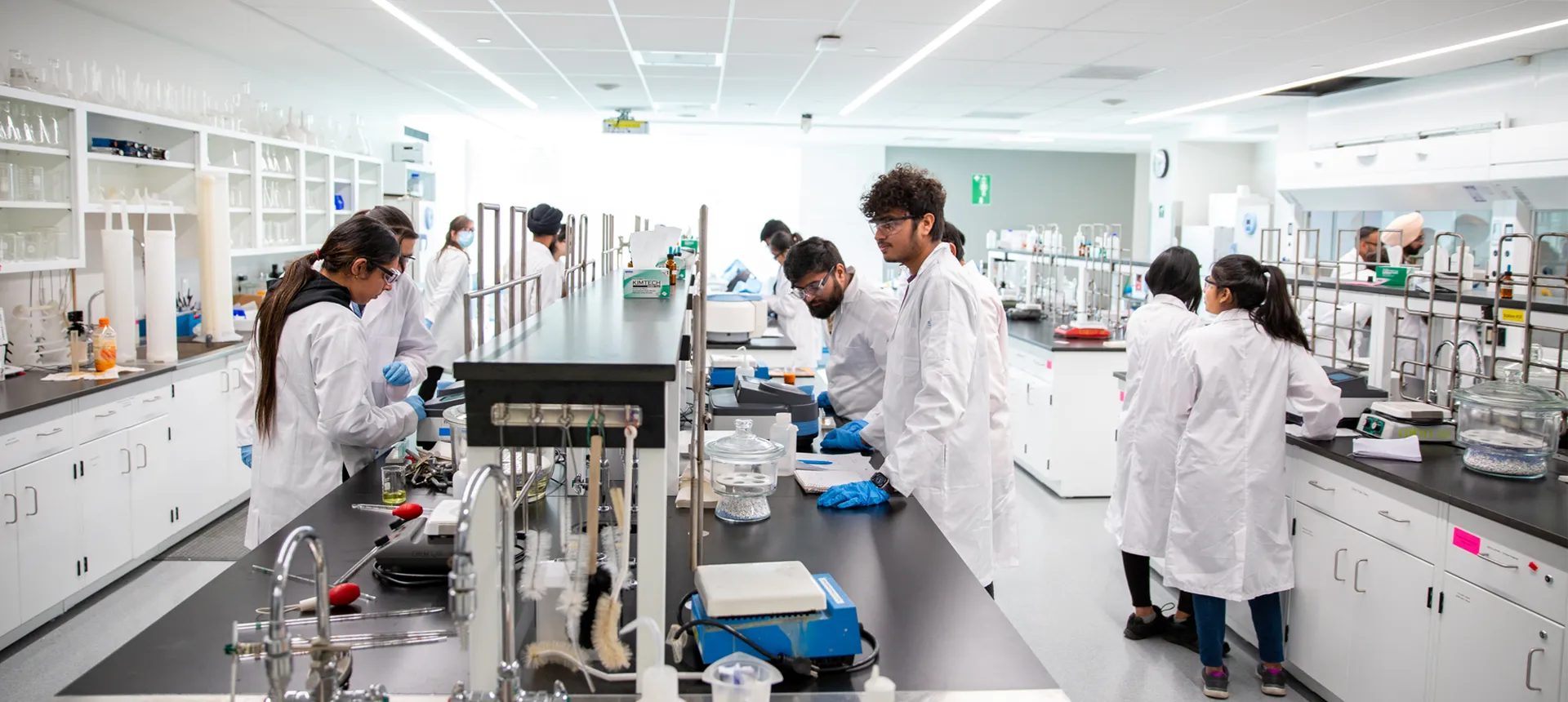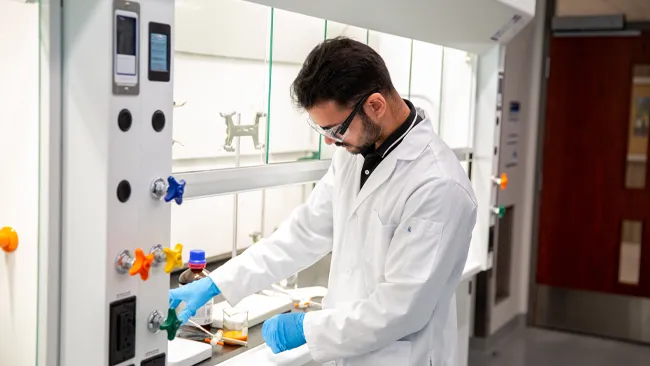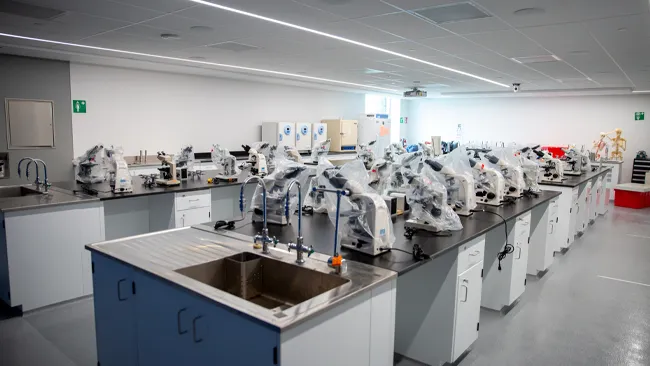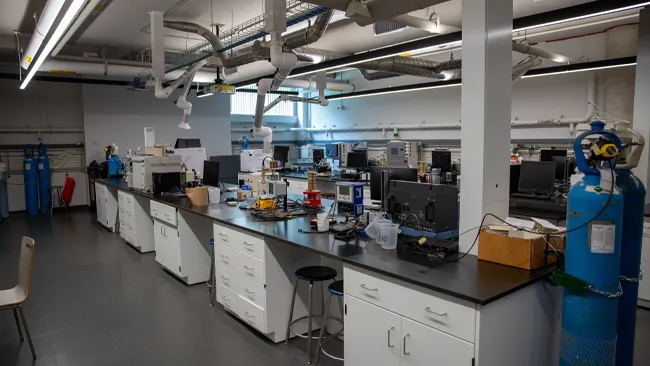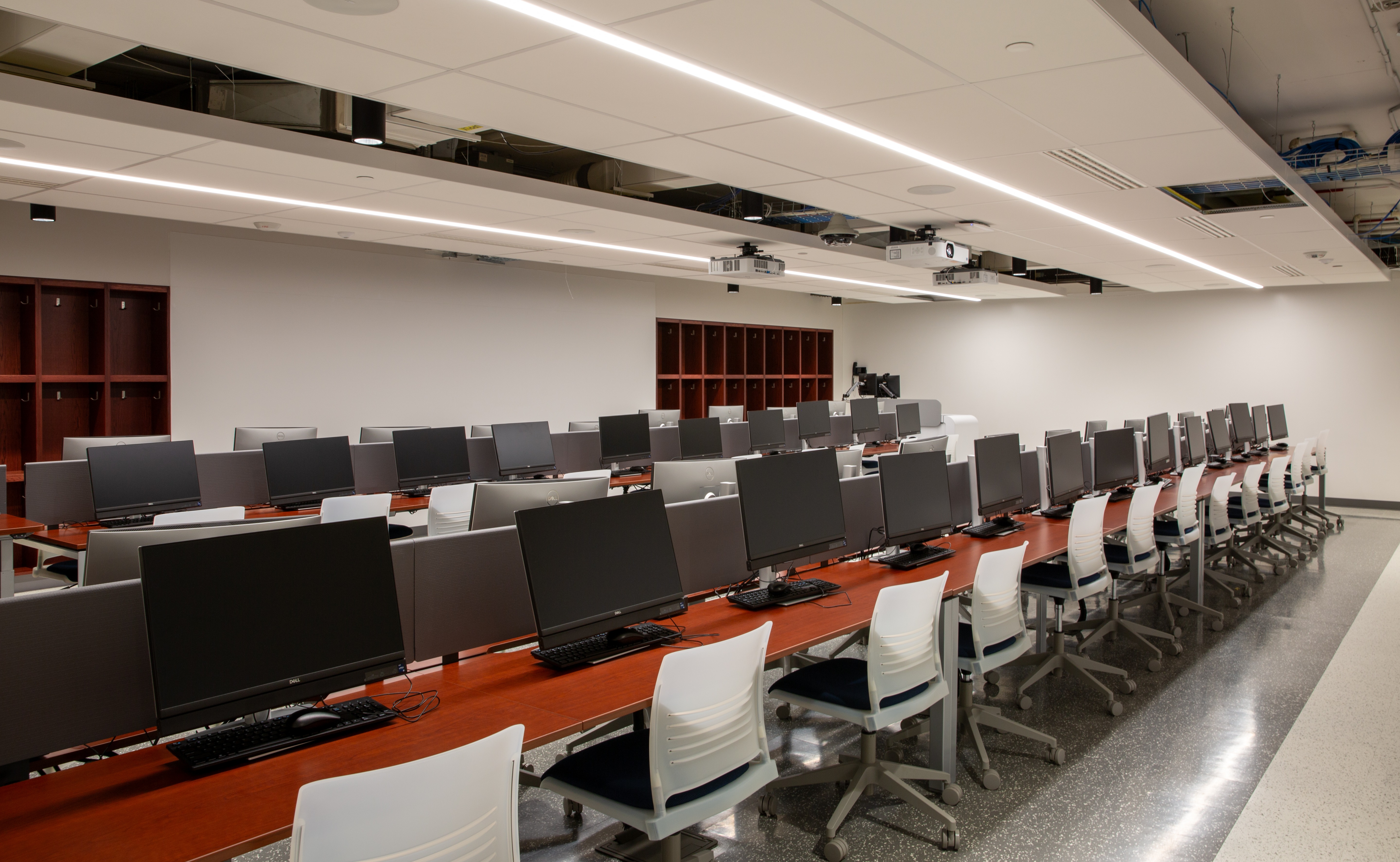Overview
Play an important role in the expanding food and beverage processing industry by ensuring food safety and quality assurance.
The food industry finds itself responding to consumer demands for more refined, sophisticated, and convenient products with an increased responsibility for processors in terms of food safety and quality assurance standards. To help support the ever increasing demand to attract highly-skilled workers to the growing food and beverage processing industry in Ontario, the Food Safety and Quality Assurance Management, Ontario College Graduate Certificate program provides extensive, hands-on training for careers in food and beverage processing, safety and quality assurance. This four term, full-time program is designed for students with previous degrees or diplomas in related sciences, engineering or food safety, and will add to previous education and skills that directly apply to the food processing environment.
Curriculum focuses on principles of food safety and quality assurance standards applicable to the Canadian food and beverage processing industries. The core elements of this program include food analysis, food safety culture, regulatory compliance, sanitation and quality management systems. The program offers a unique blend of theoretical and practical knowledge, including a co-op/project term to allow students to integrate in the Quality Assurance management team.
Graduates will have strong knowledge of food and beverage processing procedures, sanitation practices, HACCP principles, health and safety practices, food safety standards, as well as good communication, leadership and problem solving skills.
Sarnia - a Great Place to Study
Immerse yourself in Canadian culture in Sarnia's small community that cares.
Enjoy the beautiful city on the shores of Lake Huron, live affordably, and let us help you succeed in your future aspirations.
Admission Requirements
- University degree in science, chemistry, biology, microbiology, environmental, pharmacy, engineering, instrumentation, mathematics, or a related field.
The admissions process is competitive and meeting the minimum academic requirements does not guarantee admission.
Lambton College reserves the right to alter information including admission requirements and to cancel a program or course at any time; to change the program curriculum as necessary to meet current competencies or changes in the job market; to change the pathways to third-party certification bodies; or to withdraw an offer of admission both prior to and after its acceptance by an applicant or student because of insufficient applications or registrations or over-acceptance of offers of admission. In the event Lambton College exercises such a right, Lambton College's sole liability will be the return of monies paid by the applicant or student to Lambton College.English Language Requirements
- IELTS of 6.5
-or-
IELTS of 6.0 + Completion of EAP-3106 (English for Academic Purposes) during the first term of study
- or -
- TOEFL iBT 79
-or-
ITOEFL 70 + Completion of EAP-3106 (English for Academic Purposes) during the first term of study
- or -
- Passed Lambton Institute of English placement test
Please Note: IELTS is the only proficiency score accepted by the Study Direct Stream (SDS) program. Additional country-specific requirements may also be applicable.
Meeting the minimum English requirements does not guarantee admission. Students with higher English proficiency scores will receive priority in the admission assessment process. Not all students will qualify for EAP-3106 in place of the required IELTS or TOEFL test scores.
Fun Facts
- Food Processing Skills Canada states that food and beverage manufacturing business in Canada are Canada's number one employer.
- Canada’s food and beverage processing industry is projected to need 48,000 new workers by 2025.

Costs
- Term 1 $9,493.17
- Term 2 $8,989.57
- Term 3 $9,407.07
- Co-op Term $0.00
Total Cost of Program
Tuition fees are estimates and are subject to change each academic year. Fees do not include books (unless specifically noted), supplies or living costs.
Lambton College reserves the right to alter information including admission requirements and to cancel at any time a program or course; to change the location and/or term in which a program or course is offered; to change the program curriculum as necessary to meet current competencies or changes in the job market; to change the pathways third-party certification bodies; or to withdraw an offer of admission both prior to and after its acceptance by an applicant or student because of insufficient applications or registrations or over-acceptance of offers of admission. In the event Lambton College exercises such a right, Lambton College’s sole liability will be the return of monies paid by the applicant or student to Lambton College.
Additional Fees
WIL Project Fees
Students who are not successful in securing a co-op or fail to meet the co-op requirements will need to register in CPL-5559 WIL Project.
There is an additional fee of $2,100 for each student enrolled in the WIL Project course.
Important Dates, Deadline & Late Fees
For additional information on registration dates, deadlines and late fees please refer to Registration Dates and Deadlines.
Student Fees
A student services fee is included in your tuition.
Health Insurance Coverage
Emergency medical insurance is mandatory for all international students at Lambton College. This includes students who are full-time and part-time and who are on a co-op. This insurance is provided by guard.me - a third party insurance provider.
See Insurance Costs & Details
Technology Requirements
In order to keep pace with the requirements of each and every course in your program, Lambton College requires that each student have access to a laptop while studying at our college.
Labs & Equipment
Courses
Canadian & International Food Safety Regulations
This course introduces students to the laws, regulations and policies that govern food safety such as labelling, health claims and food fraud. The emphasis of this course will be on Canadian, American, and European food regulations, but will also introduce regulations from other countries. Students will examine the evolution of food laws and regulations as a result of on-going social, economic, and technological pressures. This course highlights the practical application and importance of food regulations in industry.
Principles of Food Sciences
This course introduces students to the fundamental biological, chemical, and physical properties of food, while emphasizing its importance in the nutrition, health, and well-being of consumers. This course will further provide a brief introduction to food additives, preservatives, food biotechnology and sensory evaluation.
Canadian Workplace Health & Safety
In providing an overview of Canadian Labour laws, workplace rules and regulations, and Health and Safety Hazards in the workplace, students gain an understanding of the responsibilities of employers, worker's rights as well as the responsibilities of various organizations in the Canadian labour industry. Awareness and recognition of various health and safety risks arising from a variety of occupations is also covered.
Food Processing in Canada
This course provides an overview of Canada's food and beverage processing industry, such as dairy, poultry and egg, wine, and horticulture. The principles and practices of canning, freezing, dehydration, pasteurization, and specialty food manufacture will be introduced to students.
Technical Reporting for the Canadian Food Industry
This course provides the tools required for students to plan and write well-constructed procedures, manuals and safety-related documents that conform to Canadian food processing standards. Students will learn to develop and apply the various tools that a technical report writer uses on the job.
Professional Communications
This course is designed for international students with diplomas or degrees. It focuses on polishing communications skills acquired through one's academic career and workplace experience. Through various business writing and speaking scenarios, students learn Canadian business practices and communication styles, incorporating inclusivity and diversity. Close attention is paid to proper incorporation of the intellectual property of others to ensure academic integrity. Students will practice organized and dynamic speaking and will strive for polished business documents.
Anlytical Chemistry
This course serves as an introduction to the fundamental analytical techniques required for performance in chemical laboratory-related work. Students learn the basics of performing quantitative analysis on samples based on classical volumetric techniques and modern instrumental methods. The course covers the theory and methodology for the tests that will be done in the associated laboratory course. Students evaluate the process of chemical measurement from sampling through analysis to the interpretation of results. Students learn about the use of calibration standards, methods of calibration, the significance of numerical values, choosing an appropriate method of analysis, basic principles of quality laboratory practice. Evaluations of important areas such as water quality, pharmaceuticals, and food & drink. A variety of techniques are introduced, including volumetric analysis, potentiometric and spectrophotometry.
Job Search & Success
This course provides student with skills and knowledge to help support their career search and succeed in the workplace. Students align their personal skill set and goals to guide them on their career paths. They will learn how to effectively conduct a job search, build a professional and well-tailored resume and cover letter, and develop and practice interview techniques. Students will also develop their personal brand to help support effective career networking and aid in their job search. Teamwork and collaboration in the workplace are also discussed. Self-reflection is used to inspire insight and support their professional career journey.
Principles of Food Safety & Quality Asurance
This course introduces students to food safety hazards, and their impact on the food industry. Students will examine the benefits of developing strong food safety control programs to assure safe food production. This course provides a foundation for further studies and practical applications of hazard analysis and critical control points (HACCP), and other globally recognized food safety management systems. Students will be introduced to the concept of food safety culture, good manufacturing practices (GMPs), documentation and cross functional department collaboration to ensure safe food products for consumers and brand protection.
Food Microbiology
This course explores the basics of microbial biology and its relevance to food industry, both for food safety and food production and storage. Understanding the behaviour of microorganisms in food is essential for efficient control of food quality. This knowledge is important for safe food production and storage. The course is a combination of theory and a hands-on lab work. The lab portion of the course introduces students to the basic skills in microbiological laboratory practices that are used routinely in the food industry.
Food Chemistry
This course introduces the chemistry and functionality of food constituents such as water, carbohydrates, lipids, proteins, phytochemicals, food emulsions, acids, enzymes, gels, colours, and flavours, with a focus on their reactions and interactions during processing. This course involves a combination of lab work, theory and practical assignments that will help students gain an in-depth understanding of the chemical properties of food.
Risk Assessment & Control Plans
This course provides students with a strong understanding of Hazard Analysis and Critical Control Point (HAACP) management systems, in which food safety is addressed through the analysis and control of biological, chemical, and physical hazards from raw material production, procurement and handling, to manufacturing, distribution and consumption of the finished product. This course examines key components of Canadian (CFIA) and international food safety control plans, which are critical to developing a successful and robust HACCP plan. Through theory, case studies, and collaboration students will gain an understanding of the development, implementation, and maintenance of the HACCP program.
Sanitation in Food Processing
This course provides students with a scientific framework for effective sanitation practices required in food processing. Students will examine different types of soil, unsatisfactory sanitary conditions and causes, in addition to different cleaning reagents and their applications. Students will learn about appropriate and safe handling of chemicals, as they develop and evaluate sanitation programs. The lab portion of the course introduces students to methods of detection and correction that are used routinely in the food industry.
Current Food Safety Issues
This course examines current and emerging food safety issues, in addition to changes in regulations that impact Canadian and global food safety. Food industry guest speakers and case studies offer students a deeper understanding of the challenges faced by the food industry, with an emphasis on food recalls. This course encourages students to approach food safety issues within a positive, solution-focused environment.
Quality Management Systems
This course explores the application and practical use of total quality management systems. Students will learn about GFSI (Global Food Safety Initiative) auditing standards, and GFSI recognized schemes, such as SQF and BRC. Through hands on auditing experience, students will gain a more thorough understanding of enforcement and compliance standards. This course also provides a framework for root cause analysis and recurrence prevention.
Product Development & Packaging
The first part of this course provides students with the practical skills necessary to design and develop food products from concept to commercialization. An emphasis will be placed on the importance of food innovation and collaboration, which allows organizations to stay relevant. The second part of this course offers an integrated approach to the materials used for packaging of food products, considering the physical, chemical, and functional characteristics of materials as they affect quality, marketability, handling, and user experience. This course includes a combination of hands-on lab work, theory and assignments that will help students gain an in-depth understanding of product development and packaging.
Food Analysis
This course provides students with the knowledge and skills necessary to conduct food analysis from sample preparation to data interpretation, with an emphasis on the major food components. Topics include sampling, method selection, official methods, proximate analysis, moisture, protein, fat, ash, fibre, carbohydrates, vitamins, and contaminants. Students will learn about standard methods for the assay of food components, in addition to principles and methodology of classical and instrumental techniques in food analysis. This course includes a combination of hands-on lab work, theory and assignments that will help students gain an in-depth understanding of food analysis and reporting.
Food Safety Engineering
This course provides a practical application of engineering principles to address microbial and chemical safety challenges in food processing. Students will examine intervention technologies, controls, monitoring and identification techniques, packaging applications in food safety, and engineering traceability systems. Students will gain a better understanding of environmental sampling, collection and processing of product, water, and air samples.
Co-op Work Term (Full-Time)
Co-operative education provides students with the opportunity to apply classroom learning to the workplace, undertake career sampling and gain valuable work experience that may assist students in leveraging employment after graduation. For further information regarding co-op, please refer to: https://www.lambtoncollege.ca/co-ops-placements
WIL Project
Work Integrated Learning (WIL) Project is aimed at enriching students by connecting different program areas of study, cutting across subject-matter lines, and emphasizing unifying concepts. The focus of the WIL Project is to make connections between study and industry by engaging students in relevant and meaningful activities that are connected to and practiced within the professional workplace. WIL Project allows students to enhance and strengthen their employability prospects post-graduation by fine tuning skills and knowledge and meeting the expectations of today's employers. Students are required to attend the scheduled shifts in the WIL office, reporting to the WIL Supervisor. Weekly real-world challenges are presented in the WIL office, designed by industry professionals. In addition to the weekly assigned deliverables, students are also offered professional development sessions, and exposed to industry guest speakers, enhancing their opportunity to develop their professional network.
Co-op Eligibility & WIL Project Fee
In order to be eligible to secure an approved full-time co-op work term (CPL-1049), students must have a GPA of 2.8 or greater and complete all the co-op eligibility requirements. Failing to do so will require students to enroll in CPL-5559 WIL Project at an additional cost.
Contact
Centre for Global Engagement
LAMBTON COLLEGE SARNIA
226-313-7777
1457 London Road
Sarnia ON, N7S 6K4
After Graduation
Employment Opportunities

Employment can include the following positions - food safety and quality assurance technician, HACCP coordinator, lab technician, regulatory coordinator, sanitation supervisor, product developer/food scientist, auditor, and industry consultant.
Post-Graduate Employment
International students who successfully complete their programs of study at Lambton College may be eligible to apply for a Post-Graduation Work Permit (PGWP) Program. This program allows students to gain valuable Canadian work experience.
A work permit under the PGWP may be issued for the length of the study program, up to a maximum of three years. A post-graduation work permit cannot be valid for longer than the student's study program, and the study program must be a minimum of eight months in length. The length and approval of the PGWP is determined solely by Immigration, Refugees and Citizenship Canada (IRCC).
Students must meet the eligibility requirements to apply for a post-graduation work permit.
Immigration Regulations & Changes
Immigration regulations are legislated by the Federal Government of Canada and are subject to change at any time without notice. Students are responsible for ensuring that they are in compliance with all Immigration, Refugees and Citizenship Canada regulations at all times during their studies and while in Canada. Lambton College staff are not authorized to provide advice or guidance on immigration-related matters. Prospective applicants and current students should consult the Immigration, Refugees and Citizenship Canada website or call the IRCC Call Centre at 1-888-242-2100 to answer or clarify any immigration-related questions or information.
Co-op
About Co-op
Students in this program have the opportunity to gain valuable work experience by applying classroom learning during co-op experiences.
Learn more about co-op terms and the roles and responsibilities of students and co-op advisors.
More Information
Student Responsibilities
- Course and program delivery schedules are proposed and subject to change for each intake.
- Students are required to bring their own laptop with wireless capability.
- Students are advised to bring an official copy of their most recent police clearance, driver's license, and vaccination record from their home country.

Technology Requirements
It is required that students purchase a laptop with a Windows operating system.
Internet Speed Requirements
For best performance for students learning remotely, an internet connection with a minimum of 40 Mbps download and 10 Mbps upload speed is recommended in order to effectively use video conferencing and remote lecture delivery software as well as, other online resources remotely. Due to the large area over which students may be dispersed, we are unable to recommend a specific provider, so you will need to inquire around your area to find one that best suits your needs.
Minimum Laptop Requirements
In order to access the internet and virtually-delivered software and courseware, student laptops should include the following at a minimum. By meeting the following specifications, students will be equipped to access software and courseware on their laptop through the internet:
- Intel i5 8th Gen Processor or equivalent
- 16 GB of RAM (with a minimum of 8 GB)
- 100 GB HDD or more
- HD Graphics
- Webcam with a microphone
- Wireless 802.11n/ac 5ghz capable
- Windows Operating System (Windows 11)
Software
To ensure students are getting the most our of their classroom experience, some software will be required.
Lambton College has made this software easily accessible online. Students can leverage our Microsoft Office 365 software packages and services. In addition, much of the software you require for your courses will be available on demand for use on any device - on or off campus.
